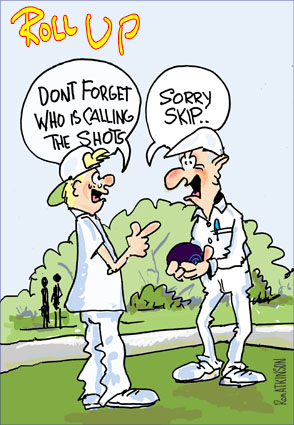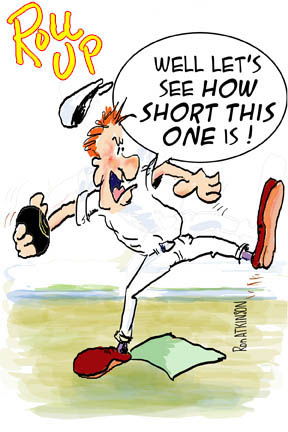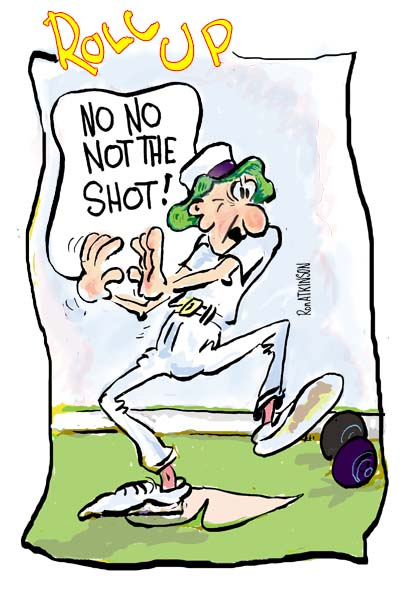Effective Skipping
How to be an effective skip

“… my checklist for enhancing your skipping experience”
Tony Allcock December 2013 BOWLS INTERNATIONAL
25 do’s when undertaking the position of skip – much more complex than simply playing bowls and giving out instructions.
DO…
1. Talk to you players beforehand, if only with a simple outcome to relax your team-mates.
2. Educate others in respect of your own self perception. (For example, I prefer to draw/I am a demonstrative skip/I prefer quick greens).
3. Practice the philosophy that a skip must always undertake a shot when the chances of success are greater than failure.
4. Remember that concentration cannot be achieved unless you have some focus.
5. Understand the player’s feelings (nervousness/serious/too relaxed) and respond accordingly.
6. Be honest and realistic.
7. Say only what you believe is helpful.
8. Understand the concept of the match (is it high competition/mildly competitive/social) and adapt accordingly.
9. Avoid being too kind. (An example of this would be exclaiming: ‘well played, that’s a great back bowl’ when you have requested a draw).
10. Be positive and maintain an air of confidence, (even though you may be nervous).
11. Adopt a style which, as a skip, acknowledges a bad bowl delivered without illustrating your own disappointment as a result.
12. Remember you are the foundation of the unit and must strive onwards, maintaining stability in all your undertakings. Appear confident (even though inside you may not be).
13. Try to avoid any form of negative comments made to members of the team about an underperforming player.

14. Keep instructions simple – be precise.
15. Give choices of shot whenever possible.
16. ‘Manage’ the idiosyncrasies of a rink in respect of finding and ‘keeping’ the ‘achievable’ hand for your players.
17. Balance the request for a shot with the ability of the player.
18. Exercise the opportunity to break any tension by finding a quip or saying something which might ‘lighten’ or ‘diffuse’ a tense situation.
19. Conserve the power of vision and thought for things that matter in order to enhance your team’s performance.
20. Be totally realistic about the opportunities the playing surface will/will not afford. (For example, never ‘conveniently’ forget that the straight hand will not allow you to bend around a short bowl to achieve the take out shot you can see. It will never happen).
21. Adopt the choice of shot in accordance with the ‘kindness’ of the playing surface whilst remembering the ‘tools’ (bowls) which the player in question is using.

22. Try to be a patient and serviceable leader when facing an adverse scoreline so that any remnants of hope for a resolve will still be prevalent amongst the team.
23. When faced with adversity such as coping with overbearing or vocal opponents, don’t be afraid to walk and play slower and above all never allow yourself to be hurried.
24. Attempt to give feedback to your players in a discreet manner; players learn more from a match which was lost than from one that was won.
25. Enjoy this wonderful sport and in order to maintain interest (and form as a skip), occasionally play at the front end of a rink and listen to the skip – you will learn a lot I am sure!

Suicidal Skipping…DON’T do it!
Tony Allcock on 16 December 2013 BOWLS INTERNATIONAL
25 things you should NOT do as a skip…
“– the habits we can adopt or acquire that might actually be detrimental to your performance or that of your team-mates.
In the main, it is important that the instructions you deliver to your team-mates are informative and useful, and also concise. Regurgitating information or explaining the obvious, such as ‘you’re tight,’ will not aid a player’s performance.
You must also ensure you are decisive when on the mat and know your players as well as you possibly can, not just ‘think’ that you know them.
So…here we have it…the 25 things you should NOT do when skipping…”
DON’T…
1. Have perceived expectations about the players in your rink. It is your responsibility to find out about them.
2. Ever assume!
3. Become dictatorial.
4. Adopt an autocratic approach.
5. Regurgitate information that is pointless – or commence a running commentary on bowls being delivered. Most players usually see what they need to correct without it being reiterated.
6. Be false by being too kind with every bowl your team-mates deliver.
7. Show negative facial or physical movements which can be seen by your players.

8. Give too many instructions.
9. Offer too many choices of shot to the players in the rink. This leads to indecision.
10. Become so concerned with the needs of your players that you forget your own.
11. Be too intimidating with specific requirement of jack length by being confrontational with your body/foot in respect of the request.
12. Allow too many people to give their opinion when deciding on a crucial shot.
13. Ever go to the mat undecided – the result will definitely be a poor execution of the required shot.
14. Enter into ‘idle conversation’ when trying to concentrate.
15. Ask a player to specifically ‘concentrate’ – it is too general. You need to direct the thought process in order for this to apply.
16. Conveniently forget the limitations of a hand when under pressure.
17. Ever be pressurised to play what may be seen by onlookers as the ‘correct’ shot. They are not the ones experiencing the situation.
18. Imagine that a player with straight bowls will be able to easily get around short bowls. You need to be realistic about this.
19. Make dramatic tactical changes without mentioning it to your players. They may disagree but this information will support your decision and may arrest confusion.
20. Relax when faced with a comfortable scoreline lead. Invariably, this lead will be caught if you do.
21. Hurry when losing. It is a fact that teams that are winning comfortably find it beneficial to play quickly – perhaps to get to the bar.
22. Ever forget that there are, predominantly, four hands on every rink and each will present a variance in line and weight.
23. Deliver bowls without sufficient thought. If you do, it is at this time you are vulnerable to all the technical faults creeping in and these just love to find a way into a player’s technical armoury during this time.
24. Play or practice too much; it is a sure way to lose form.
25. Ever assume before a match that you will lose (for whatever reason) as bowls has a wonderful record of following the exception rather than the acknowledged rule.
